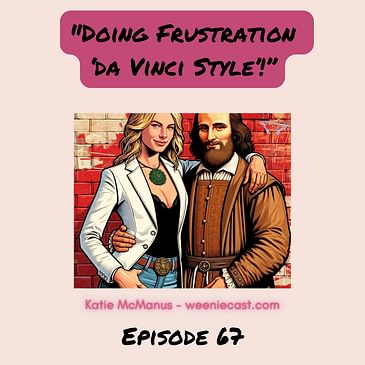Follow/subscribe in your favorite app
Or listen now via this page's player
Do you suffer from frustration intolerance? If you're an ADHD entrepreneur, you probably do.
In this episode we're talking all about this issue (which I have a different name for) and helping you get equipped so you know exactly how to handle it, and make more progress in your business.
Hi! I'm Katie McManus, ADHD entrepreneur business strategist and money mindset coach.
And welcome to "The Weeniecast."
The Significance of Frustration Tolerance in ADHD and Coachability
Frustration tolerance can have a massive influence on individuals with ADHD, and their ability to absorb coaching.
In the episode I emphasize the importance of managing emotional dysregulation, which is crucial for personal and professional progress.
You'll understand why this is a priority for tackling once you've heard the full episode but let's just say that this element of emotional intelligence plays a pivotal role in shaping your learning behaviors and relationships as an ADHD entrepreneur.
Also, your childhood responses can play a part. These are learned and amplified by educational systems which favor ease over challenge, can sculpt an individual’s lifelong self-assessment and their tenacity when facing adversity.
Powered By Podcastpage.io
Persistent Growth from Persistent Challenges
I'm going to take you through some stories that showcase the necessity of frustration as a catalyst in the growth journey.
These stories are tailored to reinforce the notion that the process of learning inherently includes facing and overcoming difficulties.
The good news is, perseverance and adaptability are skills that can be honed, and they're not just innate characteristics.
Oh, and you'll definitely understand why Leonardo da Vinci offers a lot of learning for us ADHD entrepreneurs, when we study his approach to frustration intolerance.
The Ties Between Frustration Tolerance and Coachability
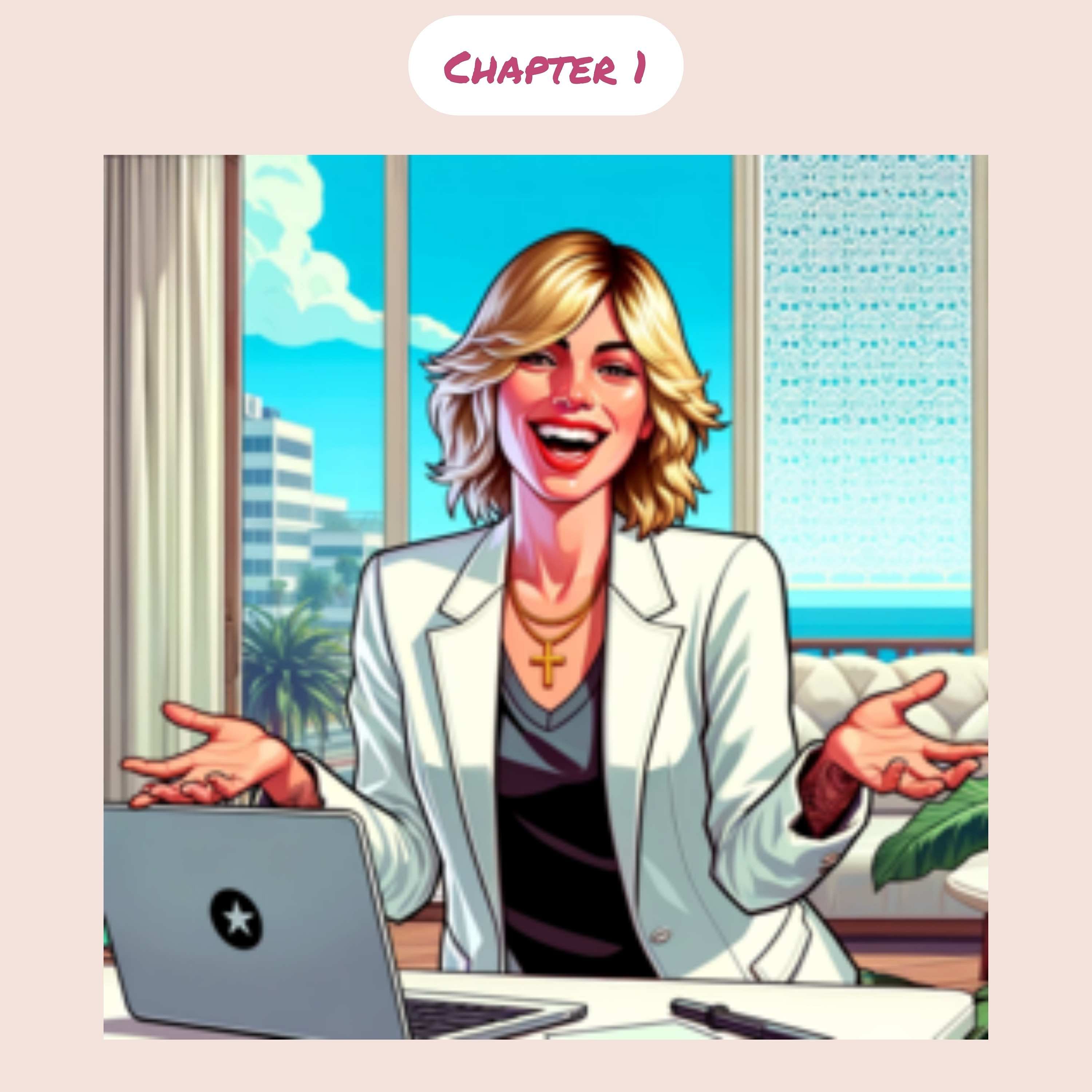
Frustration tolerance isn't just a fancy term; it's the lifeblood of being coachable, especially when you color outside the neurotypical lines.
I've seen first hand that elevated frustration tolerance opens us up to absorbing new strategies and staying agile in business. But the flip side?
That can lead to closed doors and missed opportunities. That's why understanding and incrementally building your tolerance can pivot your entrepreneurial journey from floundering to flourishing.
Emotional Dysregulation: ADHD's Sidekick
For those of us with ADHD, emotional dysregulation is often sitting in the passenger seat, creating a rollercoaster of reactions to setbacks.
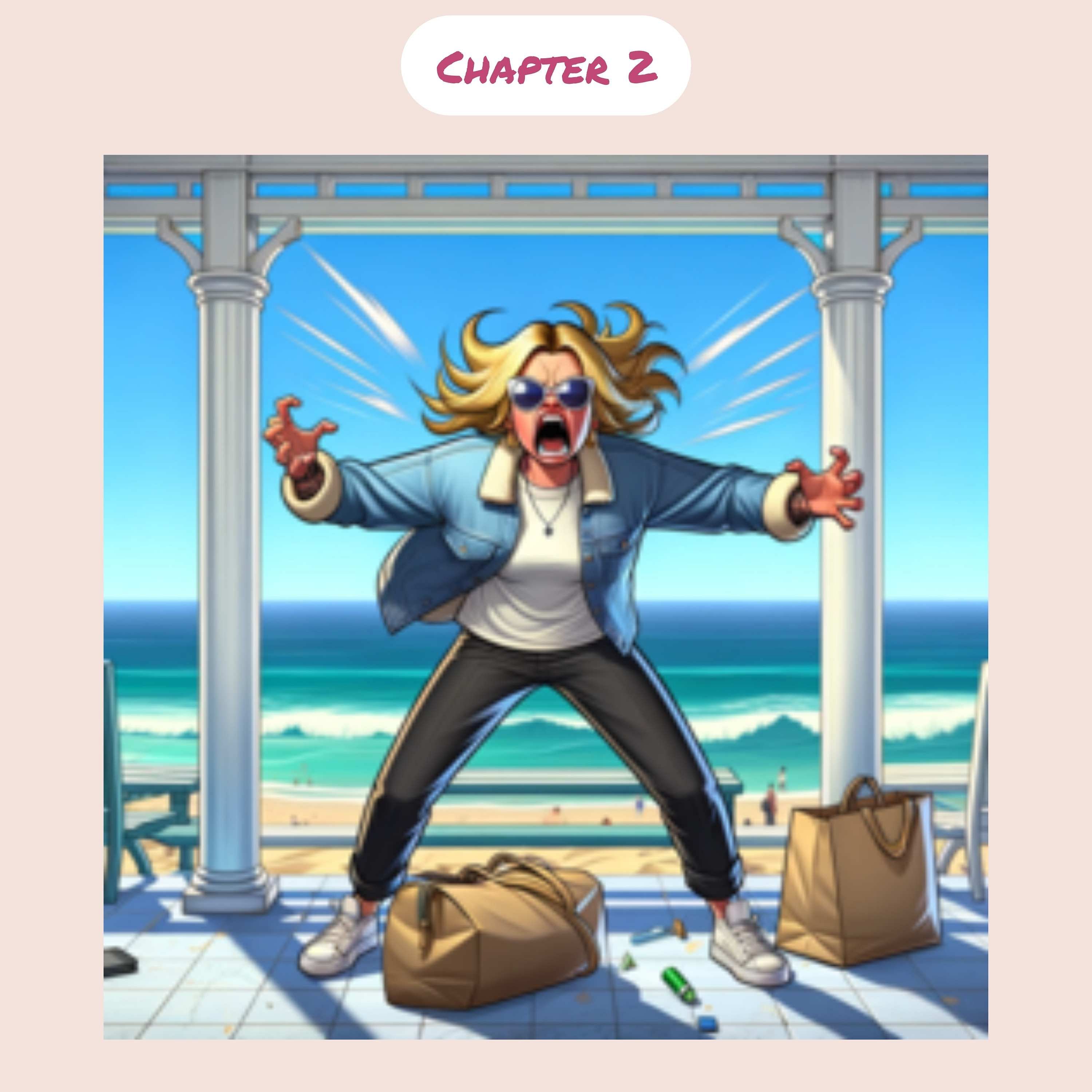
But did you know this very dysregulation could affect not only your business relationships but also the way you learn and behave? Diving into the interplay between frustration and emotion unveils strategies for personal development that can significantly impact our growth as entrepreneurs.
The Power of Therapy in Developing Coping Skills
If you've ever felt frustration boiling over at a challenge, you're not alone.
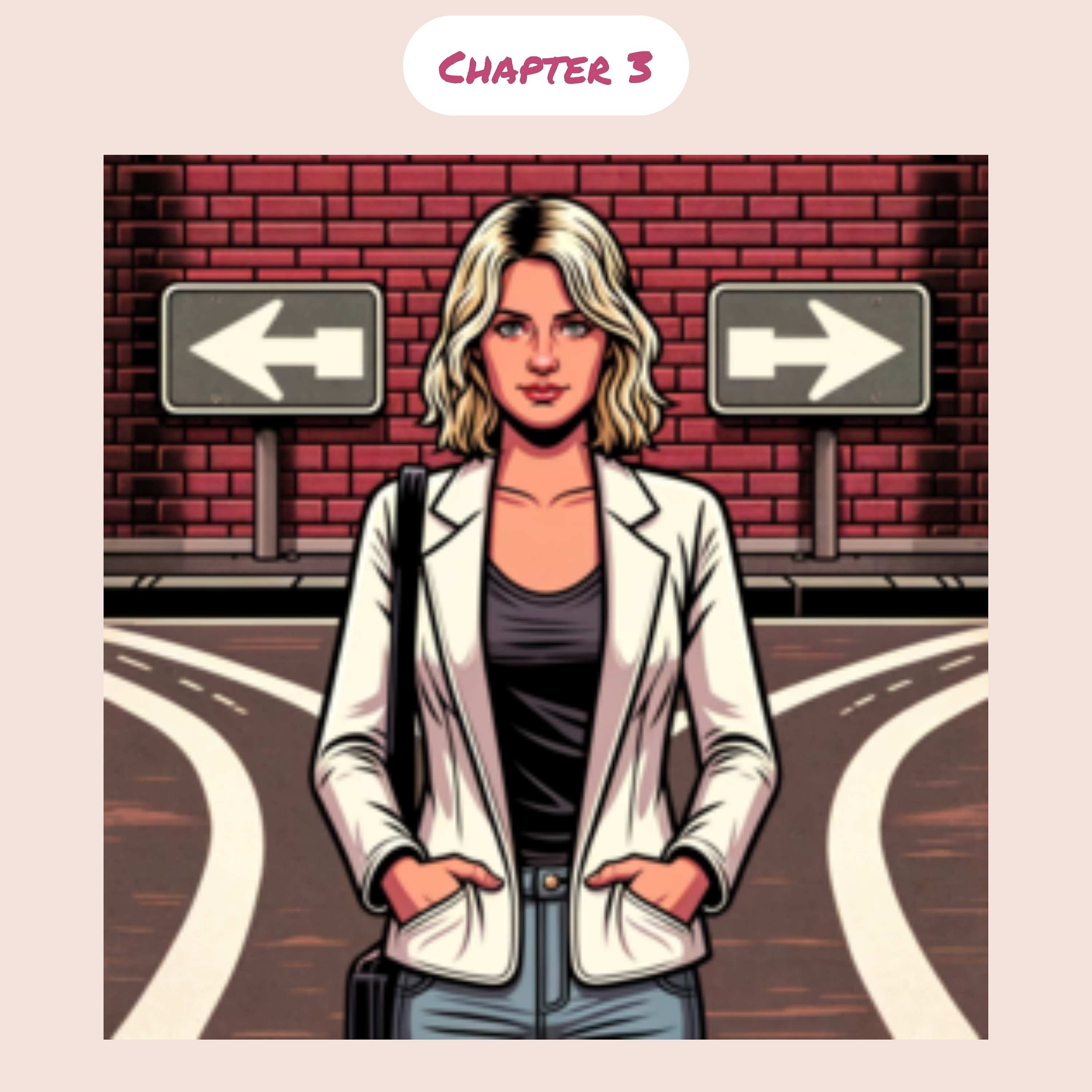
Therapy can be a transformative tool for those of us with ADHD to learn healthy coping mechanisms. Ever wonder why some people can hit a wall and bounce back while others crumble? Therapy can help us join the ranks of the bounce-backers. And yes, there's a little neuroscience magic at play here that I'm intrigued to share with you.
The Role of Parents in Developing Children’s Frustration Tolerance
Parents, this one's for you.
As we navigate our entrepreneurial journey, we've got to pave the way for the next generation.
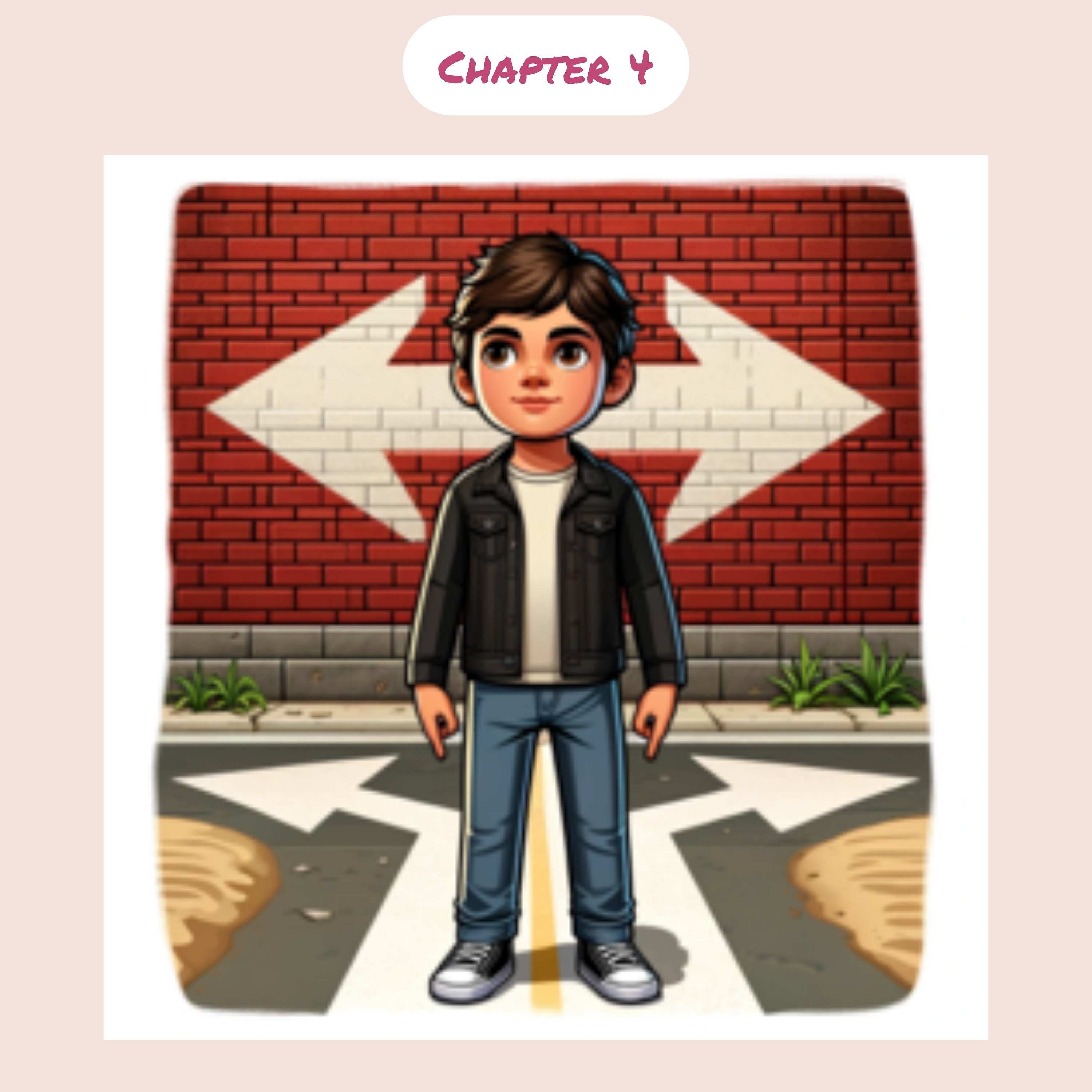
Allowing our children to experience and navigate frustration not only builds their tolerance but equips them with essential life skills. Want to know the delicate balance between stepping in and stepping back? I’ve got some insights that are golden.
Or choose your favorite app:
Timestamped summary
00:00 Lack of frustration tolerance hinders growth.
03:01 People with ADHD have emotional dysregulation challenges.
07:18 ADHD leads to emotional dysregulation, two paths.
12:24 Listening reveals frustrating experiences as key lessons.
14:39 Overcoming frustration in learning new things.
18:02 Struggling with math, Grandpa's advice helped.
20:02 Leonardo da Vinci struggles but still succeeds.
23:40 Project Runway showcases fashion creativity and competition.
27:29 Adapting to frustration and seeking help.
Prefer to watch? Click here!
Your next steps after listening
Here's the book by David Epstein - "The Range"
Wanna get this content earlier, and totally unbleeped? Subscribe to the Apple Podcasts premium version of this show - https://weeniecast.com/winners
Realising it's time to work with me? Book your free intial strategy call with me - weeniecast.com/strategycall
Get more support in your ADHD entrepreneur life by joining my hyperfocus community! - https://weeniecast.com/hyperfocus
Want to just buy me a coffee in return for some helpful insight? Thank you! Here's where you can do that - https://www.buymeacoffee.com/katiethecoach
Katie [00:00:00]:
Squirrel. Squirrel. Are you coachable? You're probably not if you don't know how to handle your own frustrations. So let's get you coachable, shall we? Hi, I'm Katie McManus, business strategist and money mindset coach. And welcome to the Weenie Cat squirrel. In the six years that I've been running my coaching business and supporting my clients, I've learned to identify very quickly the number one red flag. That means that someone is absolutely 100% uncoachable. And this one thing will not just make it super frustrating for me to try to coach them, because nothing I do will be effective.
Katie [00:00:37]:
It's also the sign that they will never do anything outside of their comfort zone that will get them to the result that they want. And this one thing is a complete lack of frustration tolerance. And what is that? So, as someone with ADHD, you know, the experience of something being so frustrating that your fuse just completely burns through and you kind of lose your temper. You get angry, you might start crying, you storm off because it's just too hard. And I say this knowing that I've been there more times than I can count, and it's usually around something that should be easier, that you see other people having a really easy time with. And why is it so hard for you? It could also be something that maybe your dishwasher is malfunctioning and it's not working the way it normally works, and you can't understand why it's just not doing the thing you want it to do. This happens in relationships when we're not getting what we need or want from our partners, and we're also not sure or comfortable with how we can ask for it. And it happens a lot when you're learning to do new things.
Katie [00:01:58]:
Most people with ADHD have a lot of memories of being a child and throwing temper tantrums. Let's really examine what a temper tantrum is. A temper tantrum is when someone gets so angry that they kind of become this volatile ball of emotion, and it has this undercurrent belief that they're doing it purposely to get their way. So a lot of people with ADHD were raised with this belief that they, as children, through temper tantrums, to get their way and were this volatile, unpredictable element in their homes, and there was a problem with them and that they needed to be fixed in some way. And as adults, this can morph into a few different things. As an adult, you can learn how to manage those feelings better. That's one of the healthier options. You can also morph into this person who avoids doing anything that could potentially frustrate you.
Katie [00:03:01]:
And let me tell you, the world of those people just gets smaller and smaller and smaller as you get older. It limits your relationships, it limits what you can accomplish. And your comfort zone, especially in a world where things are changing and technology is becoming far more advanced every single day, your comfort zone with what you're willing to do in your business, will just become smaller and smaller. Now, I've recently learned through my own therapy, the temper tantrums that I had when I was a kid, they weren't actually temper tantrums. What we were experiencing as children and what we experience as adults, especially when you have ADHD, is emotional dysregulation. When you have adhd, you have a more limited ability to kind of manage your emotional reaction to things. So something that might be slightly frustrating to someone who's a neurotypical can just kick us off into like a crying fit because it's so hard, we can't deal with it anymore, or someone's so annoying, we just can't handle them anymore, we have to kind of storm away. Now, the interesting thing that my therapist has told me, that someone who is emotionally dysregulated will instinctively do things to emotionally dysregulate the people around them.
Katie [00:04:20]:
It's something that they genuinely cannot help. So you know that feeling when someone's in a really bad mood and they are reacting to everything? There was one thing that frustrated them in the morning, and then work was, and then there was traffic on the way home, and the store was out of the thing that they were planning on getting for dinner. So then they had to change the whole plan. And by the time they get home, any little thing can set them off. And this is a healthy, otherwise emotionally healthy person who's just having a bad day, but they walk in the door and everyone in the house gets on edge. There is this emotional magnetic ripple that starts with this one person. And what it is is that emotional dysregulation, their emotional dysregulation is looking for homeostasis within the whole group of people that they're with. So it comes across as almost a temper tantrum.
Katie [00:05:24]:
It comes across as throwing your hands up and maybe a little bit of yelling and storming off and slamming cupboards and, oh, do it yourself, I can't do anything right. The whole shebang that I'm sure we're all guilty of, we've all been there, we've all been in that state where just nothing is going right and we just can't deal anymore. And so we have to go off and isolate. This is something that is natural to humans. It's more prevalent with people with ADHD because of our impulsivity and our struggle to regulate our own emotions. So if this happens to you, I want you to forgive yourself. You're a human. You're a human.
Katie [00:06:06]:
And it's caused by a whole different slew of things. It could be caused by the different hormones you have in your body, how much sleep you got, how hydrated you are, how safe you feel in your relationships if you're hungry. All these things can make you more susceptible to emotional dysregulation. But the problem with emotional dysregulation is it makes you very frustration intolerant. I mean, the classic example here is a kid who had a really hard day, maybe got a bad grade on a math exam, comes home, parents start lecturing them about, well, if you did your homework more, if you did this, you'd get better grades, and blah, blah, blah, blah, blah. And then as a punishment, they have to sit down and they have to do all the math homework that they've missed. And the math homework is hard, it's frustrating. And because they've just been emotionally dysregulated by a rough day, by feeling not supported by their parents, by feeling like there's something wrong with them, that they're not able to sit down and do their homework and or understand the homework and figure out how to do it, they're actually going to be less able to learn what they're supposed to learn.
Katie [00:07:18]:
They're going to be less able to actually do the work because they're starting from a point of emotional dysregulation. There are a few paths that a child can evolve into when they have ADHD and they have this frustration intolerance, emotional dysregulation thing going on, right? So there's the healthy path where they can learn how to deal with it, they can learn how to recover from it, they can learn how to regulate themselves emotionally, which is hard to do. It takes support of a therapist who understands what emotional dysregulation is, which, by the way, is a fairly recent conversation. So if you've been following the narrative that you were just a kid who threw temper tantrums, I want you to start looking up emotional dysregulation because it'll really help you to understand and have compassion for your younger self. Now, how you did life then is probably how you do life now. So if you're still in that cycle of emotional dysregulation, understanding what it is will allow you to have compassion for yourself and find a better way. Another path that children can evolve into is they don't understand what's happening, but they stay in that cycle. They start believing that there are just some things that are too hard for them.
Katie [00:08:40]:
They might believe that they're stupid, that they're not capable, that there's something off about them that they just have to hide away because they don't want everyone else to know that they're incapable in all these different ways. And another way that this can evolve is that this person kind of sees this as an out. If things are too frustrating and it's too hard, it can become one of the most brilliant excuses for them to stay in their comfort zone and not do anything scary and really self sabotage everything good that is happening in their life. Obviously, you know which path I want you to take, but I have to tell you, the last two paths are the hardest to coach. If you don't understand how to regulate your emotions, if you don't build a tolerance or an ability to recover from frustration intolerance, it doesn't matter how much money you spend on coaching, it doesn't matter how much money you spend on business development courses online. It doesn't matter how much money you spend on virtual assistants or organizers. Nothing in your life will ever change. And no one in those categories can help you.
Katie [00:09:56]:
A talented therapist can, however. So if you find yourself in that bucket of you're always emotionally dysregulated, you get frustrated and you give up on stuff a lot, and you make this story up about yourself that there's something wrong with you. Do not sign up for coaching. Do not sign up for all these other things. Sign up for therapy. Find a therapist who understands emotional dysregulation in people with ADHD and can help you develop healthy coping skills to overcome it. Without that, everything else would be a massive waste of money. Now, the latter two paths of that child who grows up and has an extreme inability to not be able to tolerate their own frustration, those were really trauma responses.
Katie [00:10:46]:
There was something so traumatic for childhood. You who started believing that there was something wrong with themselves, like those moments of frustration and not being able to do the thing and not feeling safe to figure it out, that was a trauma for you. And so as an adult, anytime you get frustrated, it's going to activate this whole narrative that you have that there's something wrong with you. It's going to activate all the feelings of fear and anger and again, frustration. And when you're in those emotions, when you're so viscerally in those emotions, when it's really a result of PTSD, you have no access to your creativity. You have no access to patience. You have no access to your ability to have self compassion. You need to do the emotional work to overcome that.
Katie [00:11:43]:
Now, there's this brilliant book that I want to say I read, but I listened to it on audible, and I don't know why we make up these rules in our head that when we listen to a book, it doesn't count as having read the book. It's as if the knowledge that you gained from it is somehow discounted because you didn't sit down and actually make your eyeballs read words on a page. Anyway, I listened to this book, and it's called range, and it's by David Epstein. And what fascinated me about this book is that how we learn? And actually, now that I'm saying this, I'm wondering if it was actually this book or is another book. Crap. Hold on. I just need to look at the chapters. Hold on.
Katie [00:12:24]:
It was okay. It was range. I just looked at the chapter names. I listen to a lot of books on audible because I'm not actually, like, making my eyeballs look at the words on a page and seeing the COVID Sometimes I forget which book I read something in or listened to something in. Do you guys go through this, too? Anyway, the fascinating thing that I learned through listening to this book is that the things that we get most frustrated with, we actually learn the most. So, for instance, if kids learn math in a way that feels easy to them, they are far more likely to forget it all. They will be able to pass the pop quiz the next day, maybe the exam at the end of the week. But 510, 15 years later, they will have completely forgotten how to do it because they never actually understood the principles of it, versus children who are left to be frustrated, who are allowed to really struggle with what the principles of the mathematical law or equation is.
Katie [00:13:27]:
Those kids will probably not do well on the pop quiz, and they'll probably be mediocre on their exam. However, studies have shown that 510, 1550 years later, those grown up children will remember the principles of the math. It's absolutely wild. It's one of the failings of the american school system. And I speak about the american school system because I went through it, where parents will come into a parent teacher night and they'll complain to the math teacher about how frustrated their kids are getting because they're not understanding the math and it's hard for them. And for parents, seeing your kid be frustrated is so hard, right? I mean, I don't have children, but I remember my parents being really frustrated that I was frustrated because they didn't know how to help me. And what ends up happening is we create curriculums for really difficult subjects like math and science that are easy to learn, to pass the test. But because they're easy to learn, there's no lasting memory.
Katie [00:14:39]:
And as you're listening to this, you're probably thinking about that one thing that was so hard for you to learn, but once you got it, it just clicked and you understood it and you are able to apply it in pretty much every other aspect of your life. And the reason I bring this up is because we have this belief that when we're trying to do something we've never done before and it's hard and we get frustrated. We have this belief system that because it's frustrating, it means that we're dumb, it means that this is too hard for us. It means that we're not meant to learn this, that we should just give up on it and go on to something that's easier for us. And it's especially easy for people with ADHD to buy into that because we're used to being good at stuff really quickly. And when something is hard to learn, we can make up all kinds of reasons why we just shouldn't do it. My favorite reason that I've heard people come up with to avoid doing things that frustrate them when they have ADHD is, oh, well, I must just not be interested in this. My hyper focus wants me to go somewhere else.
Katie [00:15:48]:
And if I want to be able to function within the confines of my ADHD, I really just have to follow my hyper focus. What bullshit. And really, if you want to self sabotage, great. Tell yourself that. If you want to stay in your comfort zone, tell yourself that the thing that frustrates you, that you're having a hard time doing is something that your hyper focus just won't let you focus on and your ADHD got in the way again and boohoo and move on. But do not sign up for a coach. You're going to be a misery to them. The name of the game, if you want to change your life, if you want to start a business, if you want to do anything that is outside your comfort zone is you have to develop a frustration tolerance.
Katie [00:16:32]:
You have to figure out how to recover from your frustration, so that, yes, you can walk away for a bit, but you can come back to it. And when you get frustrated again, you can walk away from it and you can come back to it again. Whenever I think of frustration tolerance, I think of Leonardo da Vinci, which I had an adopted grandpa, Gramps, who was just this fascinating man. He was obsessed with Leonardo da Vinci. So Graham's was really interesting. He actually left school in 8th grade, I think his dad had. And he was an adopted grandpa, so I don't actually know the full history of his family. It's just kind of stuff that was handed down from my parents.
Katie [00:17:12]:
So his dad died, I think, in one of the wars. And so Gramps had to give up going to school at eight years old to go to work to support his mom and his sisters. So he had an 8th grade education, but he was an avid learner and he had patents. He did really well for himself. He developed things that we still use in cars. I don't know what these things are, but he was this incredible inventor. He also, to the chagrin of my Grammy Lou, his wife Lucille, developed things like a solar heating system for their house, which only worked when the sun was out, which in the winter in northern California, you know, the sun isn't coming out very often, so their house was always freezing. So when I was in school, I really struggled to learn math, and it was something that I really didn't have a frustration tolerance for.
Katie [00:18:02]:
It was something that I thought I was stupid. And it really hurt my self confidence because everyone was telling me, well, don't get frustrated. This is easy. And when people try to assuage your frustration, tell you it's easy, when it's not fucking easy, it makes you more frustrated. But I'll never forget, and I actually still have this notebook kicking around that my gramps made for me. And it was like all these principles for math that I could always refer back to. And in it, he did things like the picture that Leonardo da Vinci did of the human body, the man that's spread eagled in a circle to show different proportions. And I remember sitting down with him and he gave me all these tools, and it was really fascinating looking back, because he taught me a lot about this guy, Leonardo da Vinci, which as a kid is like, okay, cool, here's this dead guy that was alive 500 years ago.
Katie [00:19:02]:
Awesome. But growing up, because this man was such a presence in my education, early on, I found myself researching him again and again and again and again. And Leonardo da Vinci absolutely had ADHD there's no way this man did not have ADHD. And he was also, like my gramps, an avid inventor, and most of his inventions didn't work. He designed flying machines that, I'm sorry, did not work. I don't know if he ever tested them, but I'm pretty sure people would have died. He started so many paintings that he never actually finished. And back in the day, when people would commission an artist to do a painting, and they didn't finish the painting, and they just kind of skedaddled to another city state, I can imagine that was pretty scary because these rich people had, like, people with weapons that they could hire to send after you.
Katie [00:20:02]:
And yet, here's a man who let himself be frustrated, left things unfinished, because can you imagine trying to develop a flying machine, that it's just not working, and you've been working on it for years, and it's something you're doing in your spare time, and no one's actually paying you for it because no one actually believes that people can fly. And having to walk away from it to come back to it later and maybe even just abandoning it because you think it's dumb. This man got frustrated a lot. And also, when we think of him, we don't think of his failures. We think of the Mona Lisa. We think of the incredible contributions he made to art and to culture, and we do point back to the projects that he abandoned because they were too hard, and we don't make him wrong for it. Have you ever been in a class where they talked about Leonardo da Vinci and what a loser he was because he couldn't figure out how to make an airplane in, what, the 16th century or whatever, whenever he lived? If you were in a class like that, please let me know, and let me know who the teacher is so I could shame them on this podcast. I haven't done that in a while.
Katie [00:21:11]:
In the present day, there's a lot of stuff that is beyond our initial understanding because it's advanced and we haven't had any training in it. Starting a business. And when I think back, have you ever been trained on exactly how to start a service based business where you're selling your professional expertise to people teaching you exactly how to market it, how to sell it, how to put an offer together? Probably not. There's a reason you're listening to this podcast. There's a reason why my clients come to me because they have to learn that stuff. Now, this brings me to the ways you can overcome frustration and tolerance. Oh, what am I going to say next? Well, you'll have to keep listening to find out. But first, squirrel, squirrel, squirrel, squirrel.
Katie [00:22:03]:
Now, this brings me to the ways you can overcome frustration intolerance. You can do what we'll just call the Leo method. Not Leonardo DiCaprio, but Leonardo da Vinci. Stay with me. The Leo method, where you just walk away. You walk away. You ground yourself. You let your emotions regulate themselves.
Katie [00:22:24]:
Maybe you spend some time doing something you're actually good at, and then you come back to it. Now, especially with my clients, who are also coaches, who have never started a business before and are trying to start the business, and it's really hard. Oftentimes when they get into this frustration cycle, it's usually like in the first three to six months of them starting their business. If they are really struggling to get clients for their business, I'll actually give them advice that is contrary to everything I ever teach. And it's to go and give free sessions away. It's to go and do what they're good at is coach go, give away free coaching sessions. Remind yourself of something that you're really good at, because that'll help you actually regulate your emotions. You'll build the confidence in yourself.
Katie [00:23:14]:
Back up. You'll see. Oh, yeah, that's right. I don't suck at everything. I can do some stuff really well. Awesome. And what it does is it gives you that almost energetic income to go back to the frustrating thing later with a renewed determination to figure it out. We're raised in a world that tells us we'll just try harder, push through, just make it work, as Tim Gunn would say.
Katie [00:23:40]:
And if you don't know Tim Gunn and you've never watched Project Runway, I want you to go and really watch the beginning seasons, because it's all about these people trying to design beautiful pieces of fashion in a contest. So it's creativity on demand in a competitive setting with Heidi Klum, who's this incredible model that's been in the fashion industry forever, and Tim Gunn, who literally teaches at Parsons Institute of Fashion, I think that's the name of the university in New York City, standing around watching you do it, watch people get frustrated, watch how they deal with it, and watch what the results are. The people in that competition, the ones who get frustrated and can't handle their emotions, they lose. The ones who can walk away, sit with their feelings, talk to someone, really self soothe in a healthy manner. Those are the ones who succeed. Those are the ones who get their own line at the end. By the way, this show, I was obsessed with for several years when it first came out and I kept telling my mother that she would like it and she kept being like, oh, no, I wouldn't like that. I don't really care about fashion.
Katie [00:24:47]:
But then her friend told her to watch it and she started watching it. Now she's more obsessed with it than I am and she didn't believe me. And, mom, I know you're listening to this, I'm still bitter about this and we will talk about it. She did the same thing to me about Downton Abbey. I will say that she's learned and she now trusts me with recommendations for tv shows. Anyway, back to the point. That's your strategy. Number one is do a Leo.
Katie [00:25:17]:
Walk away. Ground yourself, spend time on something you know you're good at and then come back to it. This is also a great strategy. If you have children who are struggling with that frustration cycle. If you have a kid who really loves reading but struggles with mathematics, when they're doing their math homework and they're getting frustrated, say, cool, take a break, go and read for your english class and then come back to this later. Or go out and play, or play a video game, even do something where you feel like you're building momentum and you're good at this, and then come back to the thing. That's hard. But I will say, as a parent, it's so hard to watch them be frustrated, but it's the best thing for them.
Katie [00:26:00]:
You don't want to raise a child who can't be with their own frustration. It's not going to serve them later in know the next thing feels like an oh, da sure, Katie. Of course you're going to say this kind of thing, but be well rested, give yourself a meal, be hydrated. Expecting yourself to do something that's really frustrating and hard and will take a lot of brain power that's ridiculous to do on too little sleep or without having eaten enough, or without having your brain well lubed up with water. It would be kind of like going on a road trip across country with, like, only an 8th of a tank of gas. Right. Would you expect yourself to get very far? Of course not. You're going to have to stop for gas.
Katie [00:26:44]:
Your body's no different. Set yourself up for success from the beginning. And lastly, the thing that's hardest for us, beyond saying I love you and beyond saying the word Worcestershire sauce, is ask for fucking help. Ask for help. And sometimes that help is not going to make the frustration go away. Sometimes that help is going to be someone sitting in the frustration with you and helping you recover from it and then go back to it. And then when you get worked up again, telling you to go for a walk and then come back to it, that help can reframe the thing that you're frustrated with, can explain it in a different way. I will say asking for help only actually works if you're willing to accept the help.
Katie [00:27:29]:
And really, the only people who are willing and able to accept the help are the ones who have done the therapeutic work, the emotional work, to untangle any of the trauma that they've experienced throughout their childhood and to really establish healthy coping mechanisms for dealing with frustration. All this to say, you're going to get frustrated, you're going to throw a little fit, you're going to slam doors, you're going to cry, you're going to get snotty, and you're going to have a whole woe is me, why is this so hard for me kind of moment? And that doesn't mean that you're failing at this, okay? It means that you're a human being in a meat suit that reacts that way sometimes, and that's okay. Just because you get frustrated and you lose your temper or whatever and you have a little mini breakdown does not mean that you're terrible at dealing with frustration. Squirrel, squirrel. If you're ready to stop being a weenie and actually run a business that makes money, then go ahead and book a generate income strategy call with me by going to weeniecast.com strategy. On this call, we will talk about your goals, your dreams, and your frustrations in getting there. And if it's a fit for both of us, then we can talk about different ways to work together. I like the ASMR where they're doing the noise on the thing, but they have the brushes as if they're putting makeup on your face or whatever because it's so visceral, you can feel it.
Katie [00:29:07]:
And it does kind of give you that tingly, like someone putting makeup on you kind of sensation. Squirrel, squirrel, squirt. Squirrel.

